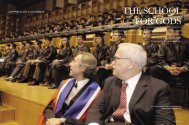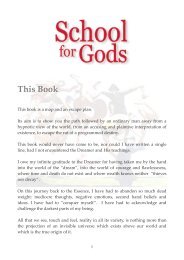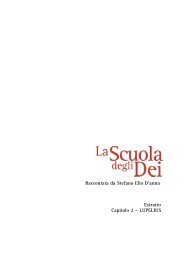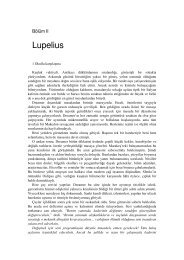Lupelius - The School for Gods
Lupelius - The School for Gods
Lupelius - The School for Gods
- No tags were found...
Create successful ePaper yourself
Turn your PDF publications into a flip-book with our unique Google optimized e-Paper software.
Greeks revealed the secret relationship between the inner and the outer world, between statesand events. <strong>The</strong>y entrusted this discovery to the ocean of time, like a message in a bottle, sothat it would reach us. <strong>The</strong> man who knows himself, his own being, the container of histhoughts, ideas, and attitudes, also knows his own future, because whatever we think isconnected to the world; our psychology is our destiny. Thinking is Destiny. Apollo is thesymbol of the world as a mirror of man’s inner self. <strong>The</strong> world is our reflection.Classical tradition tells us that Homer was a blind prophet and this is yet another messagethat has come down to us from that age of wise men that came to an end with the death ofSocrates, the last of the sages. <strong>The</strong> blindness attributed to the author of the Iliad and theOdyssey, the two great bibles of the ancient world, is emblematic of the attention paid by theGreeks to psychology, to self knowledge and states of being. Looking inside oneself is thekey to knowing the world, the road to understanding it and <strong>for</strong>eseeing its events. Noticinghow some men were capable of exceptional deeds and of undertaking enterprises wellbeyond ordinary limits, and observing how they seemed to enjoy some special protection,even in the most dangerous circumstances, and how their lives seemed to be at the centre ofextraordinary events, the ancient Greeks recognised that these men had a special nature, aluminosity of being and inner qualities that were almost divine. <strong>The</strong>y there<strong>for</strong>e concludedthat there existed two species of men: heroes and semi‐gods, on the one hand, common menon the other.In the age of Homer only semi‐gods and heroes, thanks to their extraordinary deeds, couldgain the right to an individual destiny. <strong>The</strong>ir unique and original lives were not ruled by anydivinity and were free from chance and the quirk of events. All other men were condemnedto a repetitive existence. <strong>The</strong>y were ruled by the laws of Accident and Chance and their lives,whether short or long, as well as their actions, were without purpose and destined to leave notrace.For <strong>Lupelius</strong> the difference between these two kinds of human beings, and between men ingeneral, was that they belong to different levels on the ladder of being.Wherever they meet, <strong>for</strong> a few moments or <strong>for</strong> years, men inevitably <strong>for</strong>m a pyramid, arrangingthemselves on the different levels of an invisible ladder, according to an inner, mathematical order, likeplanetary hierarchies organised according to their brightness, mass, orbits and distance from their sun.We may not be aware of it, but our destiny, the quality of our lives and the events whichaffect us, must respect this hierarchy.Understanding how everything emanates from the being and that the individual destiny ofmen, like that of an entire society, is nothing but a projection of the being, the classical Greeksused every possible means, from religion to politics, from science to philosophy, art and evenwar, to raise the spirit. <strong>The</strong> wonderful architecture of cities like Athens and works of art likethe masterpieces of Phidias, displayed in public squares, were machines that transmitted24










